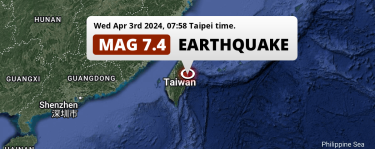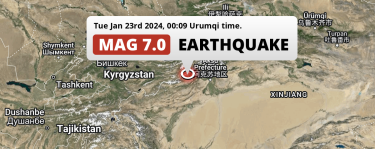Latest earthquakes near China today
Complete overview of the latest earthquakes near the country China, updated every minute. Did you feel an earthquake today in China? If an earthquake is happening right now near China (also known as 中国), it will show up within minutes.
Recent China Earthquake News
These are the latest articles published related to earthquakes occurring near China. Check our Earthquake News section for a complete overview of articles written on earthquakes near China and elsewhere.
China Earthquake Statistics
Average
A total of 4298 earthquakes with a magnitude of four or above have struck within 300 km (186 mi) of China in the past 10 years. This comes down to a yearly average of 429 earthquakes per year, or 35 per month. On average an earthquake will hit near China roughly every 0 days.
A relatively large number of earthquakes occurred near China in 2024. A total of 574 earthquakes (mag 4+) were detected within 300 km of China that year. The strongest had a 7 magnitude.

Magnitude Distribution
The table below visualizes the distribution of all earthquakes that occurred within 300km of China in the past 10 years. No earthquakes with a magnitude of 7 or above have occurred near China during this time. Usually, higher magnitudes are less common than lower magnitudes. Small earthquakes with a magnitude below 4 on the Richter scale have been omitted from this overview.
| Magnitude | Earthquakes | Percentage |
|---|---|---|
| Mag. 4 | 4001 | 93.09% |
| Mag. 5 | 280 | 6.51% |
| Mag. 6 | 16 | 0.37% |
| Mag. 7 | 1 | 0.02% |
| Mag. 8 | 0 | 0.0% |
| Mag. 9 | 0 | 0.0% |
| Mag. 10 | 0 | 0.0% |
Strongest earthquakes near China
The strongest recent earthquake of the past 10 years near China occurred on Jan 23, 2024 00:09 local time (Asia/Urumqi timezone). It had a magnitude of 7 and struck 136 kilometers (85 mi) west of Aksu, at a depth of 13 km. Discover more strong earthquakes near China in the list below.
A longer time ago, a MAG-8 earthquake struck on Dec 23, 1906 00:11, 95 kilometers (59 mi) west of Shihezi. It is the strongest earthquake near China in the past 125 years (Our data goes back to January 1st, 1900).
In the table below you will find the strongest earthquakes that occurred near China in the past 10 years. You can use the tabs to find the heaviest historic earthquakes since the year 1900 or within a specific year or distance from China.
Earthquakes by region of China
Click the links below for earthquake reports for regions in China.
- Anhui (安徽)
- Beijing (北京市)
- Chongqing (重庆)
- Fujian (福建省)
- Gansu (甘肃)
- Guangdong (广东)
- Guangxi (广西壮族自治区)
- Guizhou (贵州)
- Hainan Sheng
- Hebei (河北省)
- Heilongjiang (Heilongjiang Sheng)
- Henan (河南)
- Hubei (湖北省)
- Hunan (湖南)
- Inner Mongolia (内蒙古自治区)
- Jiangsu (江苏省)
- Jiangxi (江西)
- Jilin (吉林)
- Liaoning (辽宁)
- Ningxia Hui Autonomous Region (宁夏回族自治区)
- Qinghai (青海省)
- Shaanxi (陕西)
- Shandong (山东省)
- Shanghai (上海)
- Shanxi (山西)
- Sichuan (四川省)
- Tianjin (天津市)
- Tibet
- Xinjiang (新疆)
- Yunnan (Yunnan Sheng)
- Zhejiang (浙江省)
Frequently Asked Questions
These questions are commonly asked in relation to earthquakes occurring near China.
When was the last earthquake in China?
A 4.6 magnitude earthquake hit near China on the evening of January 2, 2025 at 20:58 local time (Asia/Urumqi). The center of this earthquake was located 33km northwest of Kuqa at a depth of 10km under land. Check the list on our website for any earthquakes occurring near China in the past hours.
What was the strongest earthquake near China?
A 8 magnitude earthquake hit near China on the night of December 23, 1906 at 00:11 local time (Asia/Urumqi). The center of this earthquake was located 95km west-southwest of Shihezi at a depth of 15km under land. This is the strongest earthquake that occurred near China since the year 1900.
How often do earthquakes occur near China?
In the past 10 years, 4298 earthquakes with a magnitude of four or higher occurred within a 300 kilometer range from China. This averages to 430 earthquakes yearly, or one earthquake every 1 days.

 Apr 3, 2024 07:58AM
Unusually powerful M7.4 Earthquake struck on Wednesday Morning in the Philippine Sea near Hualien City (Taiwan).
Apr 3, 2024 07:58AM
Unusually powerful M7.4 Earthquake struck on Wednesday Morning in the Philippine Sea near Hualien City (Taiwan).
 Jan 23, 2024 12:09AM
DESTRUCTIVE M7.0 Earthquake hit 136km from Aksu in China on Tuesday Night.
Jan 23, 2024 12:09AM
DESTRUCTIVE M7.0 Earthquake hit 136km from Aksu in China on Tuesday Night.
